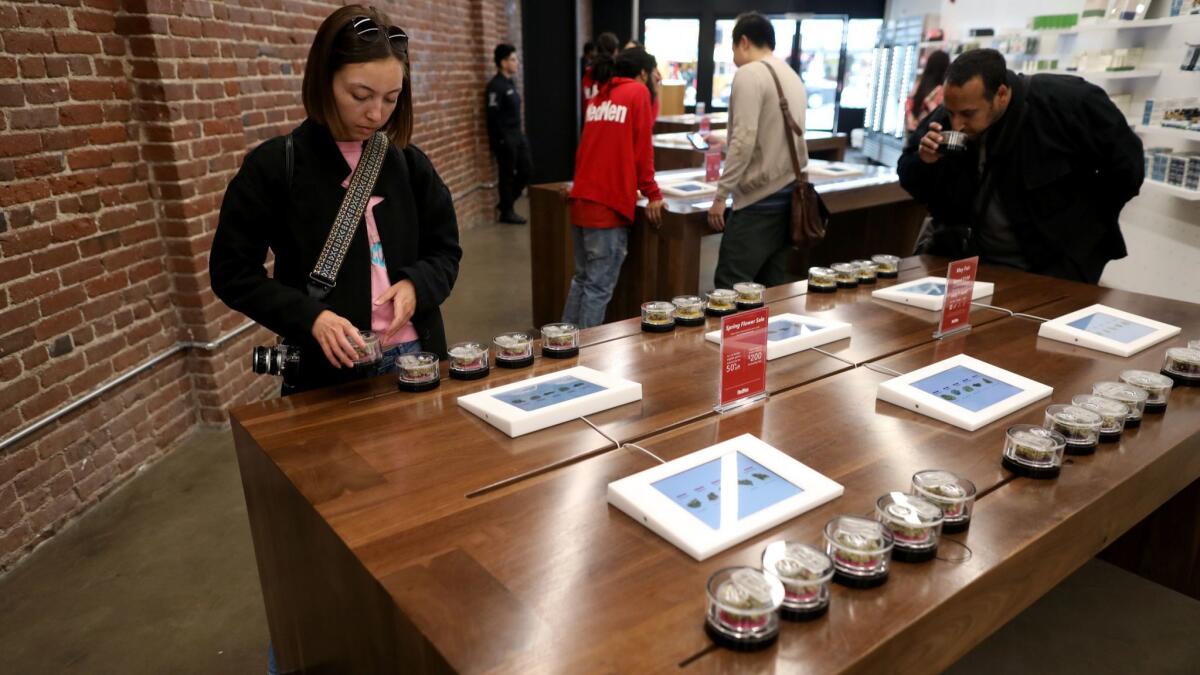Capitol Journal: Forcing California cities to allow marijuana sales is ignoring the will of voters

- Share via
Reporting from Sacramento — California’s budding cannabis industry isn’t exactly blossoming. It’s having trouble sprouting. So a San Francisco legislator has some unique ideas.
Democratic Assemblyman Phil Ting, influential chairman of the budget committee, wants the state to break a promise made to voters in 2016 when they approved Proposition 64 to legalize non-medical use of marijuana.
Voters were told unequivocally there’d be local control over how many pot shops were allowed in their communities and where they’d be located. Many cities and counties have not approved any — not even for medicinal use — although local citizens voted to legalize weed.
So Ting wants to substantially weaken local government’s control. He’d force them to approve at least one medicinal marijuana dispensary for every four liquor licenses, or one for every 10,000 people, whichever is less.
The second thing he’d do is exempt from his legislation all cities and counties that voted against Proposition 64. Only those communities that supported legalization would be forced to license pot retailers.
Also exempt from his bill would be cities and counties whose voters approved a local measure allowing at least some pot shops. And they’d be exempt if they voted not to allow any.
California might triple the number of marijuana shops across state »
So there’d still be local control by the voters — just not by their elected representatives on the city councils and county boards of supervisors.
This is a situation in which 57% of voters passed an initiative championed by current Gov. Gavin Newsom and a legislator is saying, in effect, “Never mind. It’s not working the way we want. Let’s change it without another statewide vote of the people.”
Ting says his bill, AB 1356, is necessary because the black market is flourishing in the absence of locally approved dispensaries and stunting the growth of legal marijuana retailers.
“If we don’t do something this year, we’re at risk of putting all legal cannabis out of business,” Ting told me. “The black market can operate at much lower cost with no oversight.
“We need cities to be a little more open to allowing legal businesses to start up. We’ve got to do everything we can to encourage black markets to come out in the open. There’s now no incentive for them to be a legal operator. They don’t have to deal with health inspectors, pay for permits, pay taxes.…”
But they’re at risk because they’re operating illegally, I noted. The legislator replied, “You’re only breaking the law if they can catch you.”
And let’s face it: Busting people on pot raps is a thing of the past. That was the main goal of voters who legalized marijuana.
The principal sponsor of Ting’s bill is the union that represents caregivers, United Domestic Workers of America. Some caregivers must drive many miles to buy legal medicinal marijuana for their clients, the union asserts, and often aren’t reimbursed for gas.
“There are ‘cannabis deserts’ throughout the Central Valley,” says Beverly Yu, a union lobbyist. “In Kern County, patients don’t have stable access to medical cannabis. The closest route to a licensed dispensary is 80 miles north or 90 miles south through the Grapevine.”
The failure of the legal marijuana industry to match original expectations is shown in the new revision of Newsom’s proposed state budget. His number crunchers projected $647 million in cannabis excise tax revenue for the current and next fiscal years, down $223 million from what was forecast in January.
“I’m committed to getting this back on track,” Newsom told reporters.
Newsom hasn’t taken a position on Ting’s bill. When Proposition 64 was written, the then-lieutenant governor agreed to give cities and counties local control so they wouldn’t fight the measure. It worked. They stayed neutral.
Now they’re fighting Ting’s bill, which cleared an Assembly committee on a 12-7 vote last month.
“Philosophically, cities may not want [pot shops], and that’s their right under Proposition 64,” says Charles Harvey, lobbyist for the League of California Cities. “California has the most diverse cities in the country.”
There are 255 cities where Proposition 64 passed but the city council has not approved any retail outlets, Ting says. They include Burbank and Anaheim.
“Right now you can get cannabis in Burbank and Anaheim,” Ting says. “You just can’t do it from a legal operation. It’s being sold illegally underground by people who have no idea what they’re doing.”
Cara Martinson, lobbyist for the California State Assn. of Counties, says Ting’s bill “flies in the face of Proposition 64” and is “shortsighted.”
Not even the National Organization for the Reform of Marijuana Laws is wild about the measure. “We have concerns,” Deputy Director Ellen Komp says.
“If it’s state law, it [should be] state law everywhere,” she says, criticizing all the exemptions. “I think it’s a little heavy-handed. [Marijuana] is still going to have to achieve acceptance city by city, county by county. When you try to force it on a locality, it feels threatened.”
This isn’t strictly a Democrat vs. Republican fight either.
Democratic Assemblywoman Jacqui Irwin of Thousand Oaks, a former City Council member, voted against the bill in committee. “It’s too extreme for me,” she says.
“If the local population feels differently than the city council, it can vote out those council members.”
Excellent point.
Moreover, the state really shouldn’t be breaking promises to voters. They’re already hyper-mistrustful. And this was a pledge made by a future governor.
Follow @LATimesSkelton on Twitter
More to Read
Get the L.A. Times Politics newsletter
Deeply reported insights into legislation, politics and policy from Sacramento, Washington and beyond. In your inbox twice per week.
You may occasionally receive promotional content from the Los Angeles Times.











